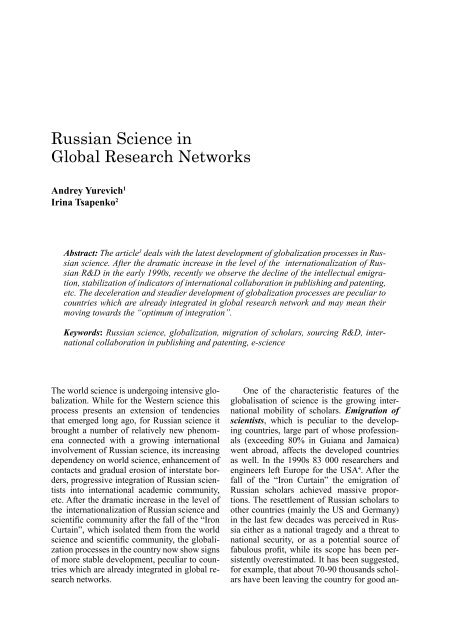State, community, individual - Societal and Political Psychology ...
State, community, individual - Societal and Political Psychology ...
State, community, individual - Societal and Political Psychology ...
Create successful ePaper yourself
Turn your PDF publications into a flip-book with our unique Google optimized e-Paper software.
Russian Science in<br />
Global Research Networks<br />
Andrey Yurevich 1<br />
Irina Tsapenko 2<br />
Abstract: The article 3 deals with the latest development of globalization processes in Russian<br />
science. After the dramatic increase in the level of the internationalization of Russian<br />
R&D in the early 1990s, recently we observe the decline of the intellectual emigration,<br />
stabilization of indicators of international collaboration in publishing <strong>and</strong> patenting,<br />
etc. The deceleration <strong>and</strong> steadier development of globalization processes are peculiar to<br />
countries which are already integrated in global research network <strong>and</strong> may mean their<br />
moving towards the “optimum of integration”.<br />
Keywords: Russian science, globalization, migration of scholars, sourcing R&D, international<br />
collaboration in publishing <strong>and</strong> patenting, e-science<br />
The world science is undergoing intensive globalization.<br />
While for the Western science this<br />
process presents an extension of tendencies<br />
that emerged long ago, for Russian science it<br />
brought a number of relatively new phenomena<br />
connected with a growing international<br />
involvement of Russian science, its increasing<br />
dependency on world science, enhancement of<br />
contacts <strong>and</strong> gradual erosion of interstate borders,<br />
progressive integration of Russian scientists<br />
into international academic <strong>community</strong>,<br />
etc. After the dramatic increase in the level of<br />
the internationalization of Russian science <strong>and</strong><br />
scientifi c <strong>community</strong> after the fall of the “Iron<br />
Curtain”, which isolated them from the world<br />
science <strong>and</strong> scientifi c <strong>community</strong>, the globalization<br />
processes in the country now show signs<br />
of more stable development, peculiar to countries<br />
which are already integrated in global research<br />
networks.<br />
One of the characteristic features of the<br />
globalisation of science is the growing international<br />
mobility of scholars. Emigration of<br />
scientists, which is peculiar to the developing<br />
countries, large part of whose professionals<br />
(exceeding 80% in Guiana <strong>and</strong> Jamaica)<br />
went abroad, affects the developed countries<br />
as well. In the 1990s 83 000 researchers <strong>and</strong><br />
engineers left Europe for the USA 4 . After the<br />
fall of the “Iron Curtain” the emigration of<br />
Russian scholars achieved massive proportions.<br />
The resettlement of Russian scholars to<br />
other countries (mainly the US <strong>and</strong> Germany)<br />
in the last few decades was perceived in Russia<br />
either as a national tragedy <strong>and</strong> a threat to<br />
national security, or as a potential source of<br />
fabulous profi t, while its scope has been persistently<br />
overestimated. It has been suggested,<br />
for example, that about 70-90 thous<strong>and</strong>s scholars<br />
have been leaving the country for good an-<br />
79


